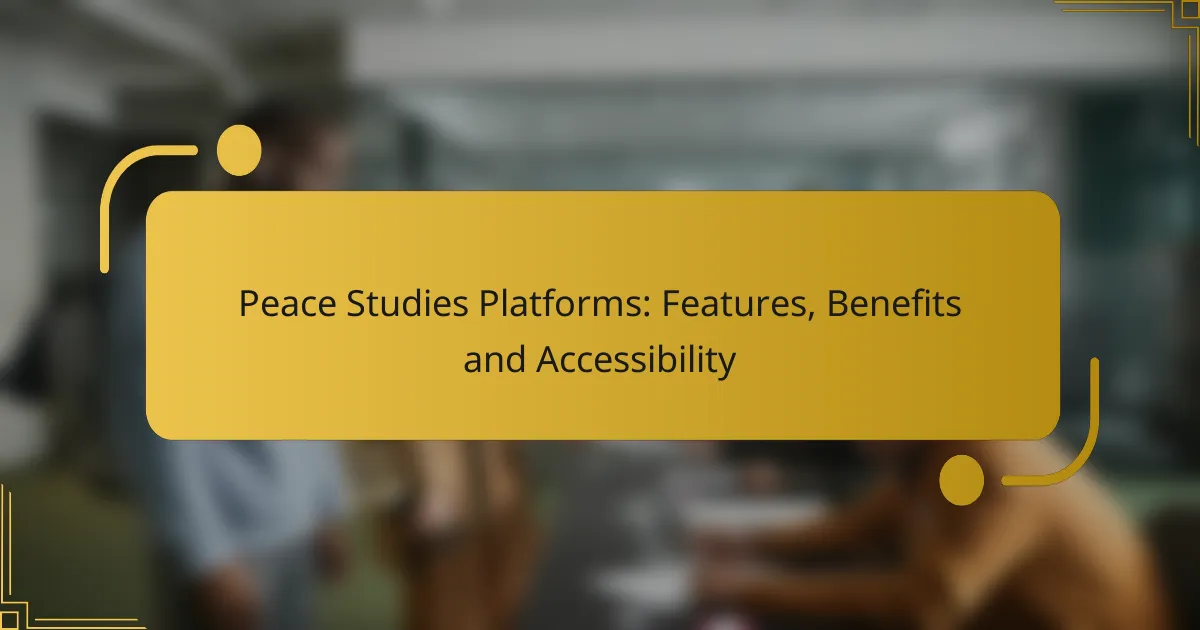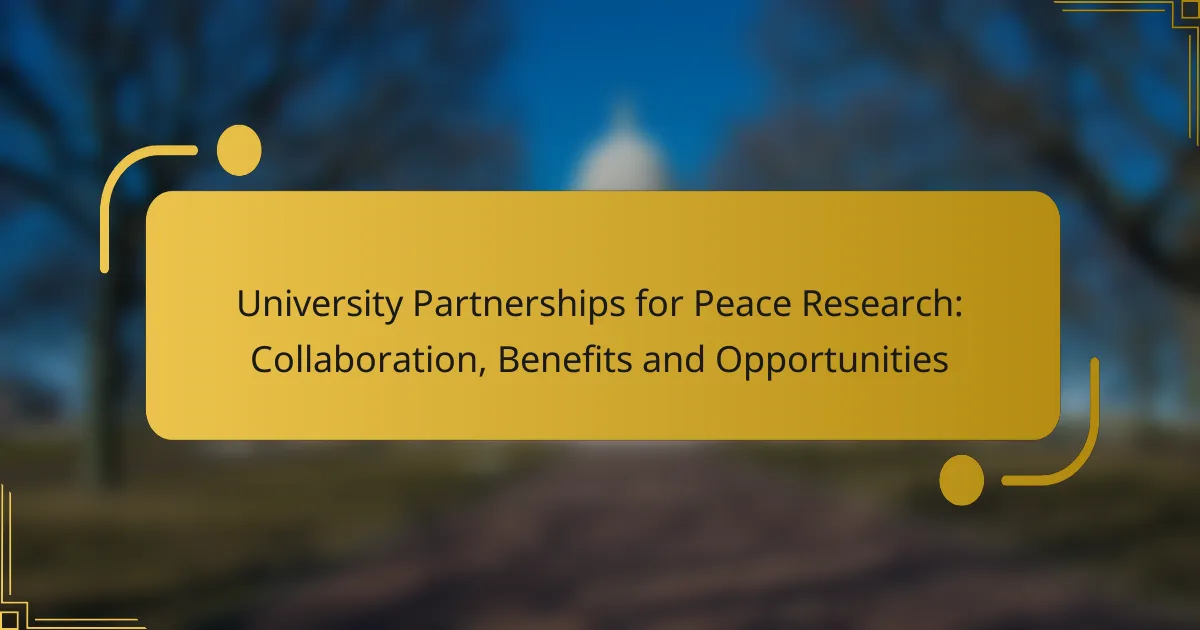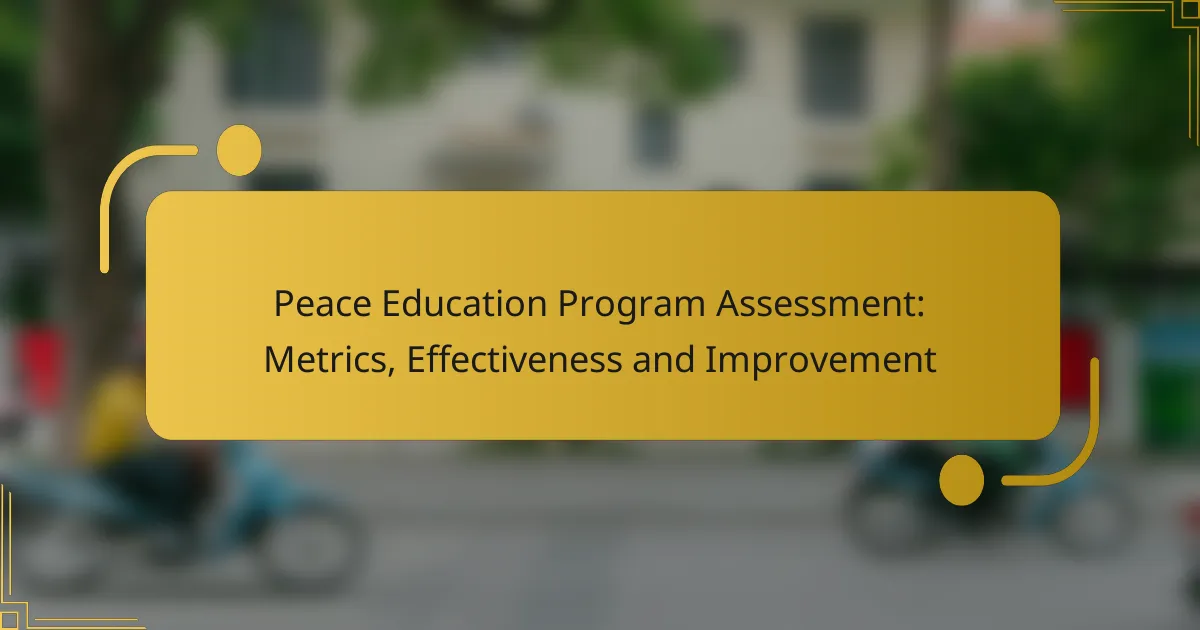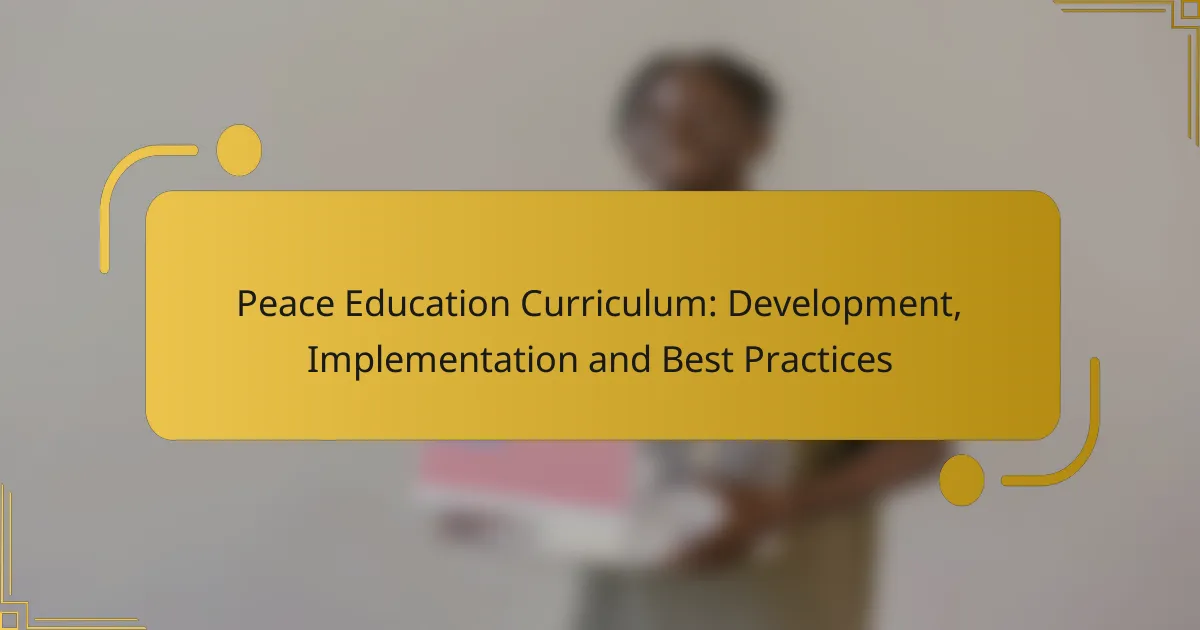Peace Studies platforms are essential resources for those interested in conflict resolution and peacebuilding, offering a variety of features that enhance learning and collaboration. These platforms provide educational materials, interactive tools, and opportunities for community engagement, making them valuable hubs for both personal and professional development in the field. With accessible programs from renowned institutions, users can deepen their understanding and connect with experts in peace studies.
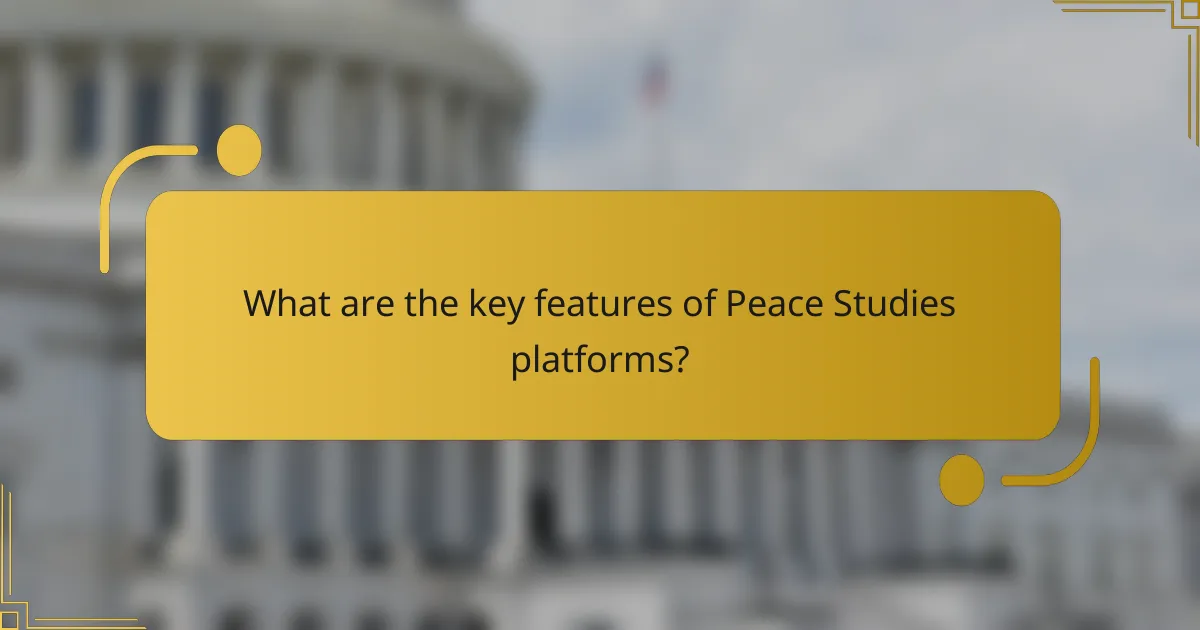
What are the key features of Peace Studies platforms?
Peace Studies platforms typically offer a range of features designed to facilitate learning and collaboration in the field of peacebuilding and conflict resolution. These platforms provide educational resources, interactive tools, and community engagement opportunities that enhance the user experience and promote effective learning.
Course offerings
Peace Studies platforms usually provide a variety of courses covering topics such as conflict resolution, peacebuilding strategies, and international relations. Courses may be available in different formats, including online modules, webinars, and in-person workshops, catering to diverse learning preferences.
Some platforms offer certifications or degrees, which can enhance career prospects in fields related to peace and conflict studies. It’s advisable to check the accreditation of these programs to ensure they meet educational standards.
Interactive tools
Many Peace Studies platforms incorporate interactive tools that facilitate engagement and collaboration among users. These may include discussion forums, live chat features, and collaborative projects that allow learners to share insights and experiences.
Interactive simulations and role-playing exercises are also common, enabling participants to practice conflict resolution techniques in a controlled environment. This hands-on approach can significantly enhance understanding and retention of complex concepts.
Research resources
Access to research resources is a critical feature of Peace Studies platforms. Users can often find a wealth of academic articles, case studies, and reports that provide valuable insights into various aspects of peace and conflict studies.
Some platforms may also offer access to databases and libraries that house extensive collections of relevant literature, making it easier for students and researchers to gather information for their studies or projects.
Community engagement
Community engagement is a vital aspect of Peace Studies platforms, fostering a sense of belonging among users. Many platforms host events, webinars, and workshops that encourage networking and collaboration among students, educators, and practitioners.
Participating in community discussions and initiatives can enhance learning and provide opportunities for real-world application of peacebuilding concepts. Engaging with a diverse group of individuals can also broaden perspectives and deepen understanding of global peace issues.
Accessibility options
Accessibility options are essential for ensuring that Peace Studies platforms are inclusive for all users. Many platforms strive to provide content that is accessible to individuals with disabilities, including features like screen reader compatibility and captioned videos.
Additionally, some platforms may offer materials in multiple languages or provide flexible learning schedules to accommodate different time zones and commitments. It’s important to explore these options to find a platform that meets individual needs effectively.
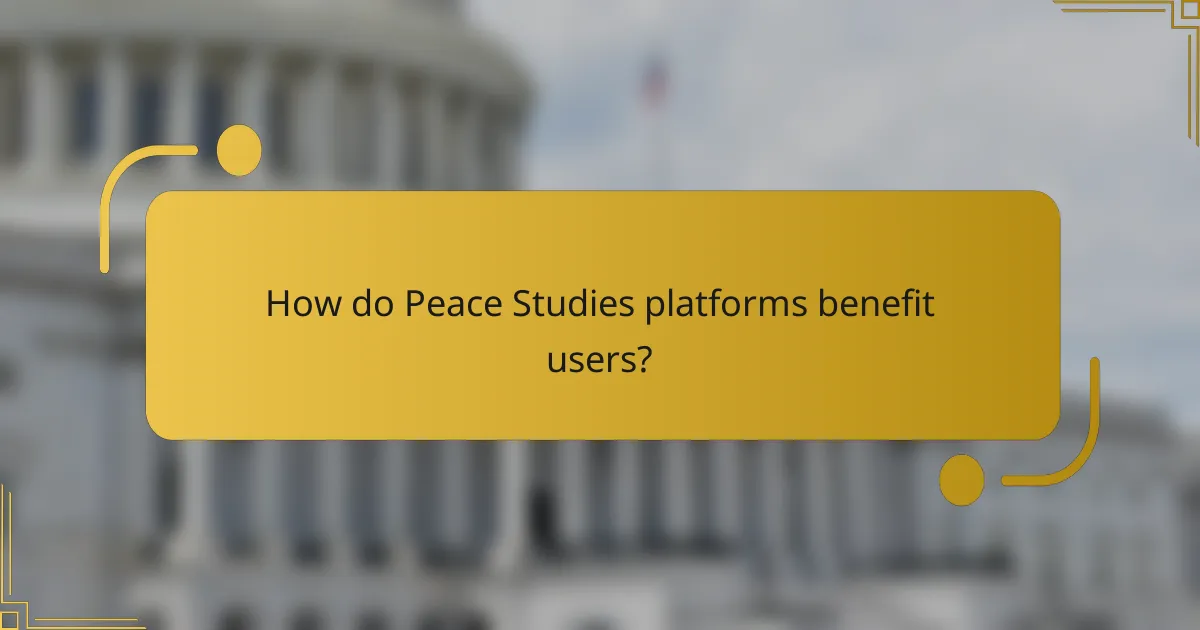
How do Peace Studies platforms benefit users?
Peace Studies platforms provide users with valuable resources and tools to enhance their understanding of conflict resolution, build networks, advance their careers, and access expert insights. These platforms serve as comprehensive hubs for education and collaboration in the field of peace studies.
Enhanced understanding of conflict resolution
Users gain a deeper comprehension of conflict resolution through various educational materials, including articles, case studies, and interactive courses. These resources often cover theoretical frameworks and practical applications, allowing individuals to analyze real-world conflicts effectively.
Many platforms offer simulations and role-playing exercises that enable users to practice negotiation and mediation skills in a controlled environment. Engaging in these activities helps users develop critical thinking and problem-solving abilities essential for resolving conflicts.
Networking opportunities
Peace Studies platforms facilitate connections among students, professionals, and academics in the field. Users can participate in forums, webinars, and conferences to meet like-minded individuals and expand their professional networks.
These networking opportunities often lead to collaborations on projects, research initiatives, or community programs, enhancing the collective impact of peacebuilding efforts. Users are encouraged to actively engage with peers to maximize these benefits.
Career advancement
Accessing Peace Studies platforms can significantly enhance career prospects for individuals interested in conflict resolution and peacebuilding. Many platforms provide job boards, internship listings, and mentorship programs tailored to the peace studies field.
By participating in courses and obtaining certifications through these platforms, users can strengthen their resumes and demonstrate their commitment to professional development. This proactive approach can lead to better job opportunities and advancement within organizations focused on peace and conflict resolution.
Access to expert insights
Users benefit from expert insights shared through articles, podcasts, and webinars featuring seasoned professionals in peace studies. These resources provide valuable perspectives on current trends, challenges, and best practices in the field.
Many platforms also host Q&A sessions or panel discussions, allowing users to interact directly with experts and ask questions relevant to their interests. This access to knowledge can inform users’ understanding and enhance their ability to contribute meaningfully to peace initiatives.
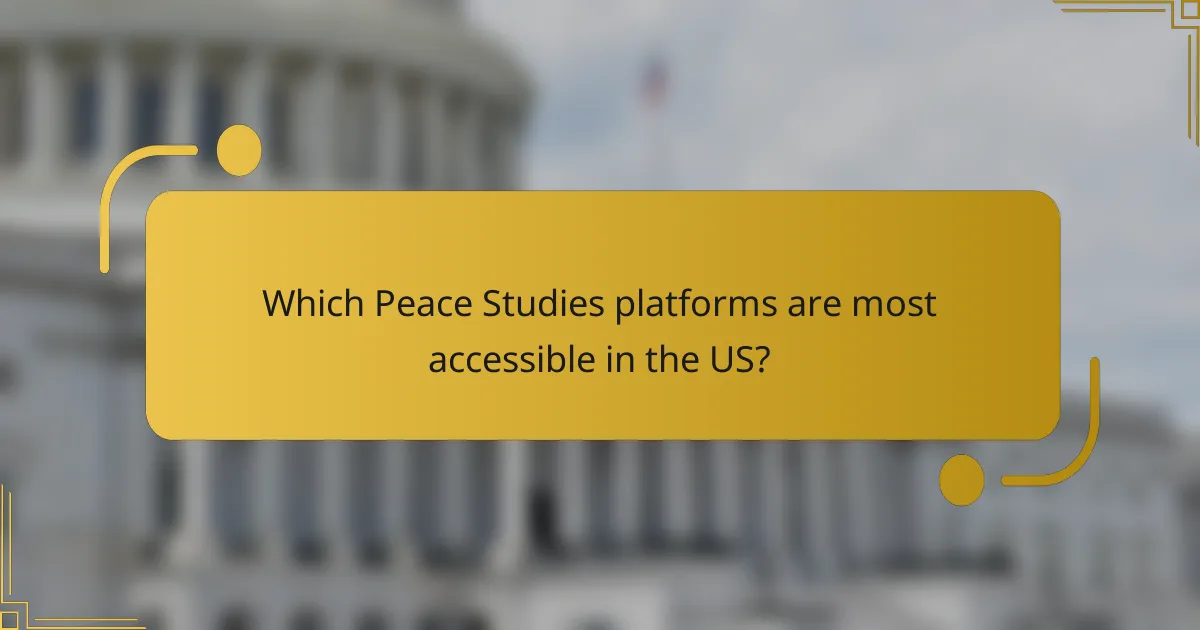
Which Peace Studies platforms are most accessible in the US?
Several Peace Studies platforms in the US offer accessible programs for students interested in conflict resolution and peacebuilding. Notable institutions include the University of Notre Dame’s Kroc Institute, Columbia University’s SIPA, and Georgetown University’s Peace Studies Program, each providing unique resources and opportunities for learners.
University of Notre Dame’s Kroc Institute
The Kroc Institute for International Peace Studies at the University of Notre Dame focuses on interdisciplinary approaches to peacebuilding. It offers undergraduate and graduate programs that emphasize practical engagement and research, making it a strong choice for students seeking hands-on experience.
Students can participate in various initiatives, such as the Peace Accords Matrix, which analyzes peace agreements globally. The Kroc Institute also provides scholarships and fellowships, enhancing accessibility for diverse student backgrounds.
Columbia University’s SIPA
Columbia University’s School of International and Public Affairs (SIPA) offers a Master of International Affairs with a concentration in Human Rights and Peace Studies. This program is designed for those interested in policy-making and advocacy related to peace and security.
SIPA’s location in New York City provides students with access to numerous international organizations and NGOs, facilitating internships and networking opportunities. The program also emphasizes quantitative and qualitative research skills, preparing graduates for various careers in the field.
Georgetown University’s Peace Studies Program
Georgetown University’s Peace Studies Program is part of the School of Foreign Service and focuses on the intersection of peace, security, and development. The program offers a comprehensive curriculum that includes conflict analysis, negotiation, and peacebuilding strategies.
Students can engage in experiential learning through internships and projects with local and international organizations. Georgetown also provides various funding opportunities, making it accessible for students from different economic backgrounds.
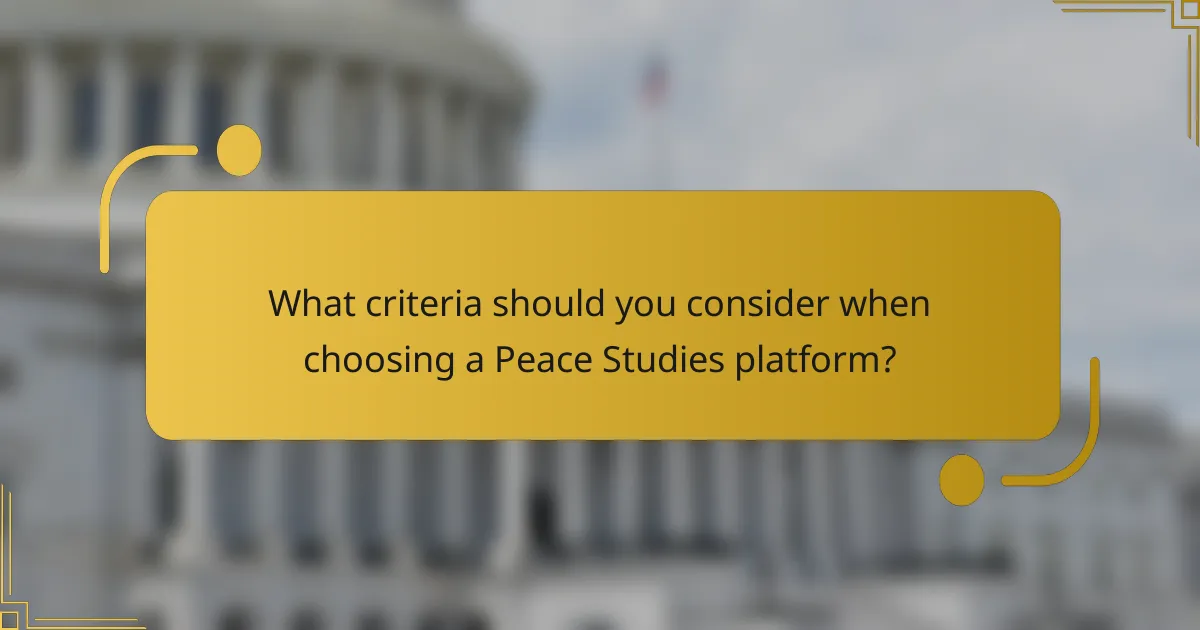
What criteria should you consider when choosing a Peace Studies platform?
When selecting a Peace Studies platform, consider factors such as accreditation, curriculum relevance, instructor qualifications, and student support services. These criteria ensure that the program is credible, aligned with current issues, taught by qualified professionals, and offers adequate support to students.
Accreditation status
Accreditation is crucial as it verifies that the Peace Studies platform meets specific educational standards. Look for programs accredited by recognized bodies, such as the Council for Higher Education Accreditation (CHEA) or regional accrediting organizations. This status can affect the transferability of credits and the recognition of your degree by employers.
Check if the platform is affiliated with reputable universities or institutions, as this can enhance the credibility of your education. Programs that lack accreditation may not provide the same level of quality or acceptance in the job market.
Curriculum relevance
The curriculum should address contemporary peace issues, conflict resolution strategies, and interdisciplinary approaches. Review course offerings to ensure they cover essential topics such as human rights, international relations, and social justice. A relevant curriculum prepares students for real-world challenges.
Consider platforms that offer flexibility in course selection, allowing you to tailor your education to your interests and career goals. Look for programs that incorporate practical experiences, such as internships or community engagement projects, to enhance learning.
Instructor qualifications
Qualified instructors bring valuable expertise and insights to the learning experience. Research the academic and professional backgrounds of faculty members, focusing on their experience in peace studies, conflict resolution, or related fields. Instructors with practical experience can provide real-world perspectives that enrich discussions.
Platforms that feature guest speakers or adjunct professors from relevant organizations can also enhance the educational experience. Engaging with professionals actively working in the field can provide networking opportunities and insights into career paths.
Student support services
Robust student support services are essential for academic success. Look for platforms that offer academic advising, tutoring, and mental health resources. These services can help you navigate challenges and stay on track with your studies.
Additionally, consider platforms that provide career services, such as job placement assistance, resume workshops, and networking events. Access to these resources can significantly impact your transition from education to employment in the peace studies field.
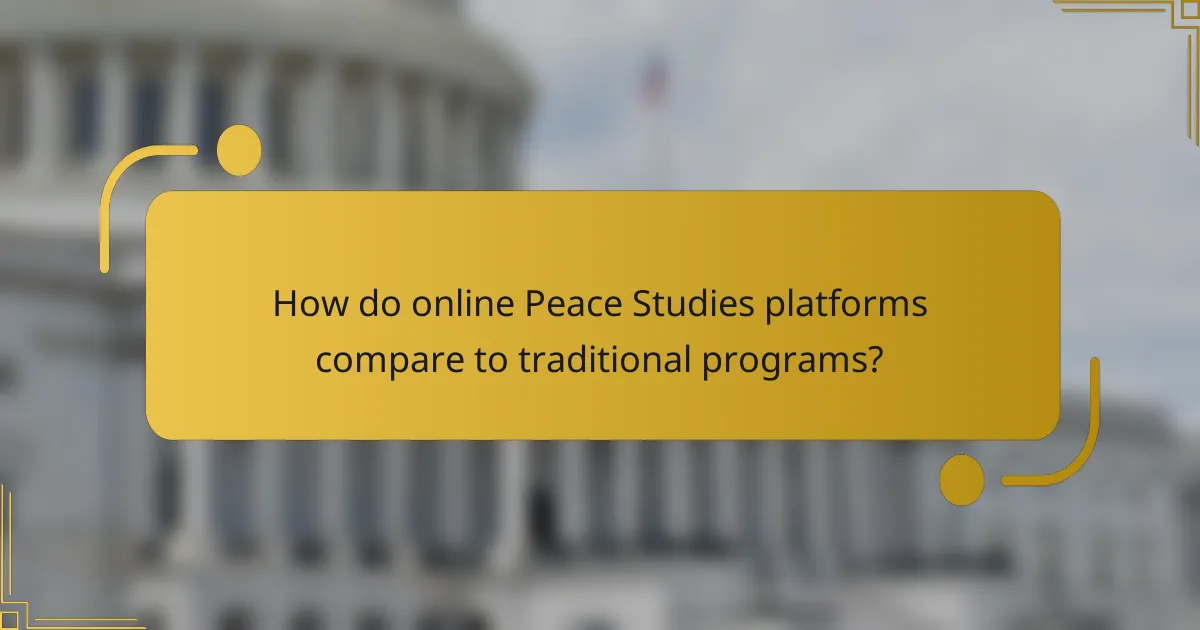
How do online Peace Studies platforms compare to traditional programs?
Online Peace Studies platforms offer a more flexible and accessible alternative to traditional programs, allowing students to engage with the material on their own terms. While both formats aim to educate on conflict resolution and peacebuilding, they differ significantly in terms of structure, cost, and networking opportunities.
Flexibility of schedule
Online Peace Studies platforms provide significant flexibility, enabling students to learn at their own pace and choose their study hours. This is particularly beneficial for those balancing work or family commitments, as they can access course materials and lectures whenever it suits them.
In contrast, traditional programs typically follow a fixed schedule with set class times, which can be challenging for individuals with other responsibilities. The ability to revisit lectures and materials online can enhance understanding and retention of complex topics.
Cost differences
Generally, online Peace Studies programs are more cost-effective than traditional ones. Tuition fees for online courses often range from a few hundred to a couple of thousand dollars, while traditional programs can exceed several thousand dollars annually, especially at well-known universities.
Additionally, online students save on commuting and housing costs, which can further reduce the overall financial burden. However, it’s essential to consider the value of in-person interactions and resources that traditional programs may offer.
Networking potential
Networking opportunities can vary significantly between online and traditional Peace Studies programs. Traditional programs often facilitate face-to-face interactions with peers and faculty, fostering strong professional relationships and collaboration.
Online platforms may offer networking through virtual events and forums, but these interactions can lack the depth of in-person connections. Students should actively seek out online communities and professional organizations to enhance their networking experience in the digital space.
